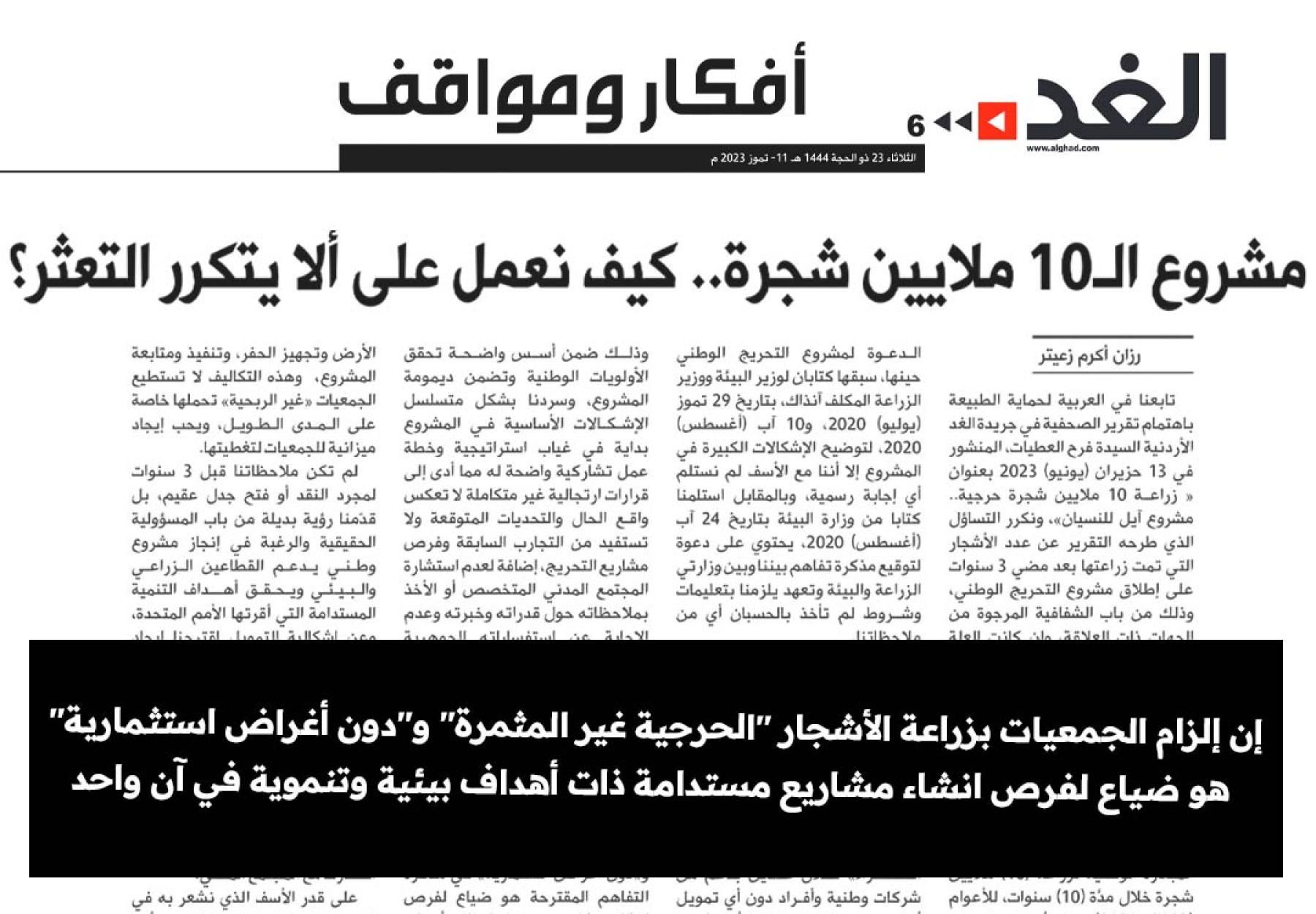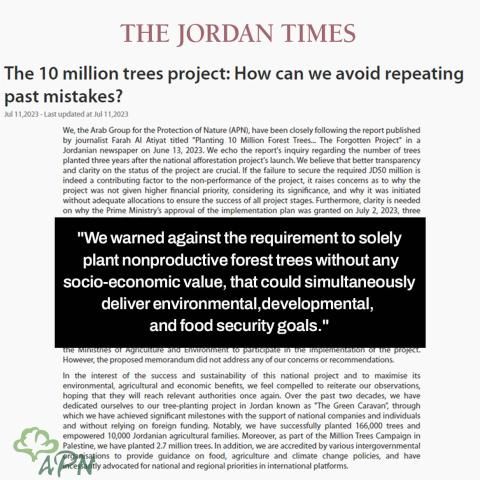
APN | Amman
11 July 2023
APN Chairperson of the Board, Razan Zuayter, revealed in an article published in Alghad newspaper (in Arabic) and The Jordan Times (in English) that APN had communicated repeatedly with relevant authorities in 2020 to express the importance of planting productive trees and involving specialized agricultural organizations and local communities to ensure the success of the national afforestation project, aimed at planting 10 million trees. Zuayter’s article comes days after the government’s recent endorsement of the project, occurring three years after its launch and despite its lack of achievement.
Zuayter wrote:
The 10 Million Trees Project: How can we avoid repeating past mistakes?
We, the Arab Group for the Protection of Nature (APN), have been closely following the report published by journalist Farah Al-Atiyat titled "Planting 10 Million Forest Trees... The Forgotten Project" in one of the Jordanian newspapers on 13 June 2023. We echo the report's inquiry regarding the number of trees planted three years after the national afforestation project's launch. We believe that better transparency and clarity on the status of the project are crucial. If the failure to secure the required 50 million Jordanian dinars is indeed a contributing factor to the non-performance of the project, it raises concerns as to why the project was not given higher financial priority, considering its significance, and why it was initiated without adequate allocations to ensure the success of all project stages. Furthermore, clarity is needed on why the Prime ministry’s approval of the implementation plan was granted on July 2nd 2023, 3 years after the project’s launch.
With deep concern, we bring forth these questions, emphasizing that from the outset of the project, we have repeatedly expressed our perspective guided by our professional principles and accumulated experience. Our approach has been based on an objective and scientific analysis of socio-economic and environmental aspects, placing importance on national and regional food security. This is particularly critical considering Jordan’s aspirations to become a regional food security hub.
Following official protocols and procedures, we submitted a “position paper” to the Ministry of Environment on 17 August 2020. Prior to this, we had sent two letters to the Minister of Environment, and the designated Minister of Agriculture, on 19 July 2020, and 10 August 2020, respectively. These letters aimed to outline the profound oversights within the project design as well as an alternative vision. Unfortunately, we did not receive a formal response. Instead, we received a letter from the Ministry of Environment dated 24 August 2020, inviting us to sign a memorandum of understanding (MOU) with the Ministries of Agriculture and Environment to participate in the implementation of the project. However, the proposed memorandum did not address any of our concerns or recommendations.
In the interest of the success and sustainability of this national project and to maximize its environmental, agricultural, and economic benefits, we feel compelled to reiterate our observations, hoping that they will reach relevant authorities once again. Over the past two decades, we have dedicated ourselves to our tree-planting project in Jordan known as "The Green Caravan”, through which we have achieved significant milestones with the support of national companies and individuals and without relying on foreign funding. Notably, we have successfully planted 166,000 trees and empowered 10,000 Jordanian agricultural families. Moreover, as part of the Million Trees Campaign in Palestine, we have planted 2.7 million trees. In addition, we are accredited by various intergovernmental organizations to provide guidance on food, agriculture, and climate change policies, and have incessantly advocated for national and regional priorities in international platforms.
Three years ago, we expressed our readiness, which still stands today, to collaborate with government institutions and all actors involved in the national afforestation project. We red-flagged the absence of a comprehensive participatory strategy and action plan, that engages specialized civil society actors, which resulted in impromptu decisions that overlooked actual and anticipated challenges, and disregarded past experiences.
We have emphasized the need to establish selection criteria for organizations, target locations, and tree species and warned against the requirement to solely plant nonproductive forest trees without any socio-economic value, that could simultaneously deliver environmental, developmental, and food security goals. By prohibiting the planting of trees that could generate economic returns to cover costs, the proposed MOU places the greatest burden on nonprofit organizations for project implementation and sustainability. This includes water resources, irrigation networks, security against overgrazing and illegal logging, land rehabilitation and preparation, as well as project implementation and maintenance. These expenses cannot be borne by nonprofit organizations, especially in the long run.
We proposed that this budget be sourced from the project budget itself, climate change grants, or contributions from private companies. We also suggested that the duration of the agreement with implementing partners allows sufficient time for proper monitoring, evaluation, and maintenance. Lastly, we stressed the necessity of partnering with the local community to ensure their active involvement and ownership of the project.
While we deeply regret that our previous comments were not considered, we remain committed to supporting any initiative aimed at advancing the agricultural and environmental sectors in Jordan. Despite the challenges presented by this lengthy journey, we remain optimistic. We believe that success is still attainable if a transparent and participatory mechanism is established for the design, implementation, and monitoring of the project, involving public institutions, specialized civil society organizations, and the local community benefiting from the tree-planting activities.
Click here to read the article in Arabic in Alghad newspaper
Click here to read the article in English in The Jordan Times
